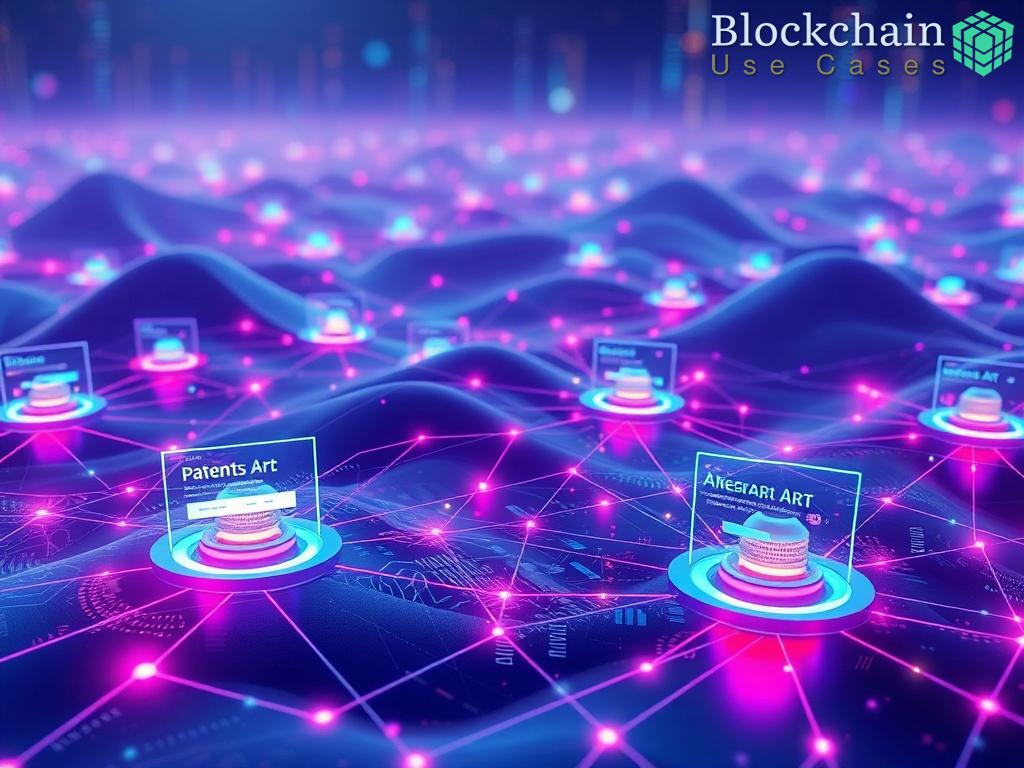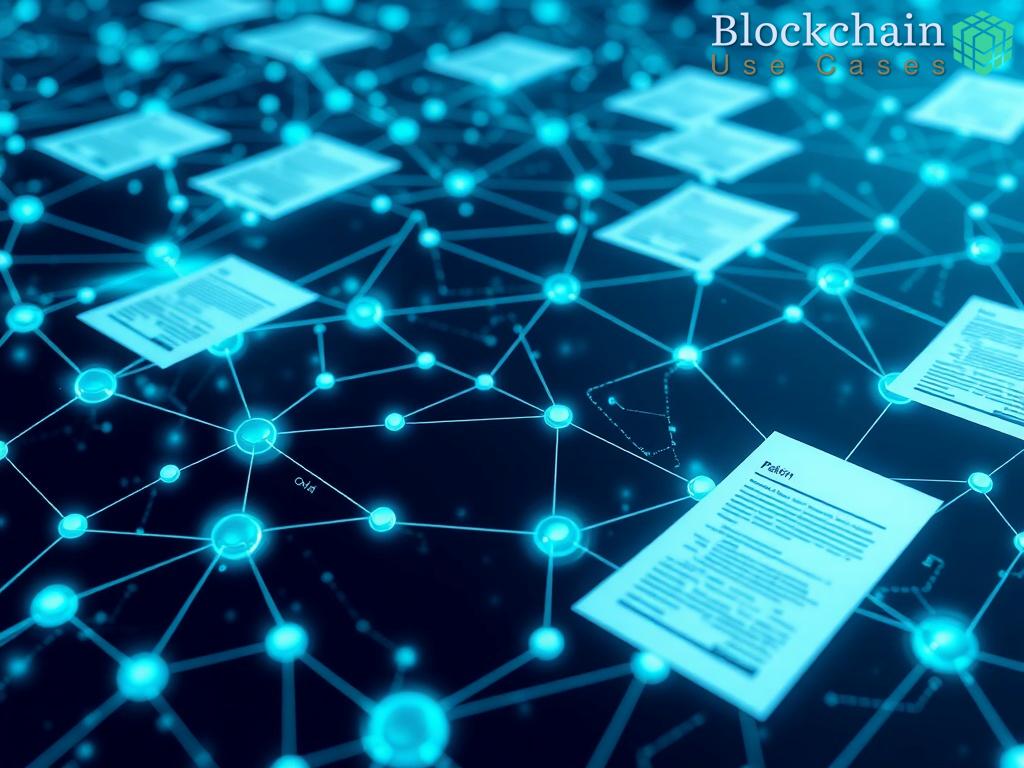Blockchain Technology in Intellectual Property Management

The traditional frameworks for managing intellectual property (IP) have often been riddled with inefficiencies, disputes, and a lack of transparency. As AI continues to reshape industries, the need for innovative solutions becomes paramount. Enter blockchain technology, a decentralized and immutable ledger that promises to revolutionize how we manage and protect intellectual property rights. By leveraging blockchain, creators and innovators can ensure their works are securely documented, tracked, and monetized without the need for intermediaries.
Implementing blockchain technology in IP management offers a myriad of advantages that can streamline processes and enhance security. Below is a comparison of traditional IP management versus blockchain-based systems:
- Transparency: Blockchain provides a public ledger, allowing all stakeholders to view IP ownership and transaction history.
- Security: The decentralized nature of blockchain minimizes the risk of data tampering and fraud.
- Efficiency: Smart contracts automate licensing agreements, reducing the time and cost associated with traditional IP transactions.
- Global Reach: Blockchain operates on a global scale, enabling instant cross-border transactions without the complexities of local laws.
- Cost-Effectiveness: By removing intermediaries, creators can retain a larger share of their revenue.
While the benefits of blockchain in IP management are compelling, there are challenges that must be addressed before widespread adoption can occur. Some key considerations include:
- Legal Frameworks: Current IP laws may not fully accommodate blockchain’s decentralized nature, necessitating legal reforms.
- Technical Complexity: The integration of blockchain technology requires expertise and can pose technical challenges for users unfamiliar with the system.
- Adoption Resistance: Stakeholders in traditional IP management may resist transitioning to a new system due to a lack of understanding or fear of change.
As blockchain technology continues to evolve, it is crucial for stakeholders to navigate these challenges collaboratively, ensuring a secure and efficient future for managing intellectual property in the rapidly advancing world of artificial intelligence.
Smart Contracts for Automated Licensing

As the landscape of intellectual property management evolves with the advent of decentralized systems, smart contracts emerge as a transformative element in the licensing arena. These self-executing contracts, embedded with the terms of the agreement directly into lines of code, facilitate a seamless and automated process for managing IP rights in the realm of artificial intelligence. By minimizing human intervention, smart contracts not only enhance efficiency but also significantly reduce the potential for disputes and misunderstandings.
One of the most compelling features of smart contracts is their ability to enforce agreements automatically. This means that once a creator publishes an AI-generated work and sets the licensing terms, the smart contract takes over, executing payments and granting access to users without the need for intermediaries. In this way, creators can ensure that they are compensated fairly and promptly for their contributions, which is especially crucial in a field where traditional licensing processes can be cumbersome and slow.
The integration of smart contracts into the IP management process provides a dual advantage of transparency and security. Every transaction involving the licensing of AI-generated content is recorded on a blockchain, allowing all stakeholders to trace ownership and usage history. This level of transparency not only builds trust among users but also serves as a deterrent against potential infringements. Moreover, as smart contracts operate on a decentralized network, the risk of data breaches and unauthorized alterations is significantly minimized, ensuring the integrity of the licensing agreements.
Looking forward, the adaptability of smart contracts presents a myriad of opportunities for innovation in IP management. As the AI industry continues to expand, so too will the complexity of the licensing arrangements. Smart contracts can be programmed to handle multi-tiered licensing deals and varying payment structures, accommodating a wide range of business models. This flexibility is particularly beneficial for creators who engage with multiple platforms and need a robust solution that can dynamically adjust to their evolving needs.
Furthermore, the potential for integrating smart contracts with other advanced technologies, such as AI and machine learning, could lead to even more sophisticated licensing systems. For instance, AI could analyze usage patterns and automatically adjust licensing fees based on demand, providing a responsive and efficient solution that benefits both creators and users alike.
Decentralized Marketplaces for IP Transactions
The rise of decentralized systems has ushered in a new era for intellectual property (IP) management, particularly in the realm of artificial intelligence (AI). As creators strive to protect their innovations, decentralized marketplaces have emerged as a groundbreaking solution for facilitating IP transactions. These platforms leverage blockchain technology to establish secure, transparent, and efficient environments for buying, selling, and licensing IP rights. By eliminating traditional barriers, decentralized marketplaces empower creators and users alike, fostering a more dynamic and accessible IP ecosystem.
Decentralized marketplaces stand apart from conventional IP trading platforms due to several distinctive characteristics that enhance the user experience and provide significant advantages. By utilizing smart contracts and blockchain technology, these marketplaces offer unparalleled features that redefine how IP transactions are conducted.
- Transparency and Trust: Every transaction is recorded on an immutable blockchain, ensuring all parties have access to verifiable ownership and transaction history.
- Direct Peer-to-Peer Transactions: Creators can directly engage with buyers, eliminating intermediaries and reducing associated costs.
- Automated Licensing Processes: Smart contracts facilitate seamless licensing arrangements, enforcing terms and conditions without the need for manual intervention.
- Global Accessibility: Decentralized marketplaces operate on a global scale, allowing creators from various regions to reach a broader audience.
- Fractional Ownership: The ability to tokenize IP assets enables fractional ownership, making it easier for multiple investors to share in the benefits of an IP asset.
Despite the significant advantages offered by decentralized marketplaces, there are challenges that stakeholders must navigate to fully realize their potential. Addressing these challenges is crucial for the maturation of the decentralized IP landscape.
- Legal Recognition: The legal frameworks governing IP rights may not yet recognize transactions conducted in decentralized marketplaces, necessitating the development of new regulations.
- Technical Barriers: Users may face learning curves associated with blockchain technology and decentralized platforms, which can hinder widespread adoption.
- Market Fragmentation: The emergence of multiple decentralized marketplaces can lead to fragmentation, making it difficult for users to determine which platform best suits their needs.
As decentralized marketplaces continue to evolve, their integration with advanced technologies such as AI, machine learning, and big data analytics holds immense potential. These innovations can enhance the capabilities of decentralized platforms, leading to more sophisticated IP management solutions. For example, AI algorithms can analyze market trends to optimize pricing strategies, while machine learning can improve user experience by personalizing content and recommendations.
In conclusion, the emergence of decentralized marketplaces represents a pivotal shift in the management of intellectual property within the AI domain. By harnessing the power of blockchain technology, these platforms not only streamline transactions but also empower creators to take control of their IP rights in a more transparent and efficient manner. The future of IP management is undoubtedly decentralized, paving the way for a more equitable and innovative creative landscape.
Data Privacy and Security in AI-Driven IP Systems
As the world embraces the integration of artificial intelligence (AI) with decentralized systems for intellectual property (IP) management, ensuring data privacy and security has emerged as a paramount concern. The unique characteristics of decentralized environments present both opportunities and challenges in safeguarding sensitive information. In this landscape, creators must navigate the complexities of maintaining confidentiality while benefiting from the transparency and efficiency that blockchain technology offers.
Guarding Sensitive Information with Advanced Encryption
In a decentralized IP framework, the protection of creator information and proprietary data hinges on robust encryption methods. Unlike traditional IP management systems, where data is often stored in centralized databases susceptible to breaches, decentralized systems utilize cryptographic techniques to secure data. This ensures that only authorized parties have access to sensitive information. As AI-generated content proliferates, employing advanced encryption strategies becomes essential in mitigating risks associated with unauthorized access and potential exploitation of creative works.
Moreover, the use of public and private keys in blockchain technology enhances data security. Only individuals possessing the corresponding private key can access or modify the information, creating a formidable barrier against unwanted intrusions. The transparency of blockchain, coupled with these security measures, fosters a trustful environment where creators can confidently share their innovations without fear of compromising their intellectual property.
Decentralized Identity Solutions: A New Paradigm
Another pivotal aspect of data privacy in AI-driven IP systems is the implementation of decentralized identity solutions. Traditional identification methods often rely on centralized authorities, creating vulnerabilities in data management. In contrast, decentralized identity systems empower users to control their own data, allowing them to selectively share information with others while retaining ownership. This paradigm shift not only enhances the privacy of creators but also streamlines the licensing process by enabling secure authentication without the need for intermediaries.
By leveraging decentralized identities, creators can ensure that their IP rights are protected, as these identities can be linked to their respective works on the blockchain. This linkage provides a verifiable record of ownership while minimizing the risk of identity theft or fraud. As the ecosystem continues to evolve, the integration of decentralized identity solutions will play a crucial role in shaping a secure and privacy-focused environment for IP transactions.
Understanding Risk Management in Decentralized IP Systems
While decentralized systems present significant advantages in terms of data privacy, they are not devoid of risks. Understanding potential vulnerabilities and implementing effective risk management strategies is essential for creators navigating this new landscape. Threats such as smart contract bugs, user error, and phishing attacks can pose challenges to data integrity and security.
To address these concerns, it is vital for stakeholders to invest in comprehensive education and awareness programs that empower creators with the knowledge to protect their assets. Furthermore, regular audits and updates to smart contracts and security protocols will be necessary to adapt to the ever-evolving threat landscape. By fostering a culture of vigilance and proactive risk management, the decentralized IP community can work towards creating an environment where data privacy and security are prioritized, ultimately leading to enhanced trust and collaboration among all participants.
Regulatory Challenges in Decentralized IP Frameworks
The advent of decentralized systems for managing intellectual property (IP) in artificial intelligence (AI) has introduced a paradigm shift in how creators protect and monetize their innovations. However, this transformation is not without its complications. As these systems operate outside traditional frameworks, they face significant regulatory challenges that could hinder their growth and acceptance in the broader market. Understanding these challenges is crucial for stakeholders who wish to leverage the advantages of decentralized IP frameworks.
One of the most pressing issues is the inconsistency in legal recognition of decentralized IP rights. Many jurisdictions still adhere to conventional IP laws that do not account for the nuances of blockchain technology and smart contracts. This discrepancy can lead to confusion among creators, especially when attempting to enforce their rights in multiple regions. For instance, while a creator may have secured their IP on a blockchain, the lack of legal frameworks recognizing such ownership could leave them vulnerable to infringement. Thus, it becomes imperative to foster dialogue among regulators and industry stakeholders to create a cohesive legal framework that acknowledges and protects decentralized IP.
Furthermore, compliance with existing regulatory standards poses another significant challenge. Decentralized systems often operate without intermediaries, which can complicate adherence to regulations that require accountability and traceability. For example, the implementation of Know Your Customer (KYC) and Anti-Money Laundering (AML) regulations may not seamlessly fit within a decentralized model where anonymity is a core principle. As a result, regulatory bodies may impose stringent guidelines that could stifle innovation and discourage participation in decentralized marketplaces.
As the ecosystem evolves, it is crucial for developers and creators to engage with regulators to ensure that compliance measures are not only practical but also conducive to fostering a vibrant IP market.
In light of these regulatory challenges, a collaborative approach is essential to shape the future of decentralized IP management. Stakeholders must work together to advocate for regulatory reforms that reflect the realities of decentralized systems. This could involve forming industry alliances that promote best practices in compliance and encourage regulatory bodies to consider the unique attributes of blockchain technology. By fostering an environment of cooperation, the community can pave the way for innovative regulatory solutions that support the growth of decentralized frameworks while safeguarding the interests of creators.


















